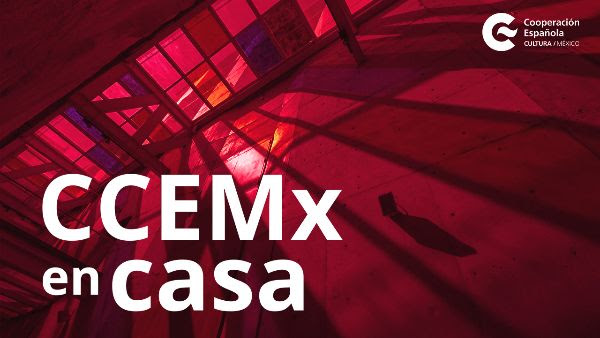

Agenda
ARMARIOS ABIERTOS
Hasta el 3 de julio / Zoom
Continuamos con este evento que destaca la presencia y representación de la comunidad LGBGTIQ+ en las producciones y manifestaciones culturales iberoamericanas. Programa completo y más información.
FORMACIÓN
#MUS3OS: ¿El contenido viral puede ser arte?
Viernes 3 de julio / 17 h / YouTube CCEMx
Una obra de arte famosa ha sido contenido viral, pero, ¿es posible que un contenido viral se considere una obra de arte? Esta conversación con SOMOSLANUEVAOLA y Janet40 será sobre la negociación del concepto de arte en ámbitos digitales de experimentación. Más info.
CINE
Ciclo: Clásicos contigo
Sábados 4 y 11 de julio / 17 h / Facebook, Twitter e Instagram CCEMx
Disfruta de este ciclo de títulos imprescindibles para comprender el cine español: comenzamos con El espíritu de la colmena de Víctor Erice y Los santos inocentes de Mario Camus. Más info.
CIENCIA
Universos paralelos de ciencia y arte
Jueves 9 de julio / 18h/ YouTube CCEMx
¿Te interesa la idea de los universos paralelos, las computadoras cuánticas y su relación con la literatura? En esta charla conversaremos de ello con Gerardo Herrera, Gabriela Frías y Pepe Gordon (novelista y periodista cultural). Más info
FORMACIÓN
#MUS3OS: ¿Cómo convivirán los cuerpos cuando los museos reabran?
Viernes 10 de julio / 17 h / YouTube CCEMx
La experiencia de visitar un museo será distinta tras la emergencia mundial, no solo por los protocolos sanitarios, sino por la configuración de las prácticas artísticas que involucran al cuerpo. Conversaremos con Mariana Arteaga (coreógrafa y curadora) y Silverio Orduña (curador) al respecto. Más info
INFANTIL
Nadadores de cuentos
Todos los domingos hasta el 19 de julio / 12 h / YouTube CCEMxLas niñas y niños de nuestra compañía de narración oral te cuentan una leyenda nueva cada domingo al mediodía. Suscríbete a nuestro canal de YouTube para no perderte los episodios.Más info.
LABORATORIO DE CIUDADANÍA DIGITAL
¡Anímate! a animar!
Un sitio web que reúne más de 200 cortometrajes hechos por niñas y niños en nuestros talleres de animación stop motion en distintas zonas del país. Aventuras, leyendas y divertidos personajes te esperan en estas historias. Más info
Frecuencia Mmm
Todos los martes de julio, de 19 a 21h
Sesiones gratuitas curadas por Radio Nopal y CCEMx Radio, que tienen el objetivo de formar productorxs de radio con una perspectiva amplia, que va desde la filosofía “hazlo tú mismo”, el desarrollo comunitario, tecnológico y algunas derivaciones. Más info.
Talleres y convocatorias
INFANTIL
Lo que me gusta y lo que no me gusta / Taller de 10 a 12 años
Inscripciones en ccemx.org antes del 7 de julio
En este taller te proponemos el siguiente reto: escribamos sobre las cosas que nos gustan y las que no, al estilo de Manuel Vicent en su artículo de El País. A través de unas píldoras audiovisuales, las y los participantes nos enviarán su resultado. Más info e inscripciones
MÚSICA
#TécnicaES: Montaje y grabación de producciones musicales
Inscripciones en ccemx.org antes del 9 de julio
El objetivo de este taller es ampliar el uso de herramientas multimedia aplicadas a la creación sonora: cualidades científicas del sonido, captación analógica y digital, formas de resguardo y herramientas útiles para el tratamiento sonoro son algunos temas a tratar. Más info.
ESCÉNICAS
Taller virtual: Variedades del futuro
Inscripciones en ccemx.org antes del 12 de julioTaller teórico y práctico en el que las/os participantes cruzarán sus prácticas artísticas contemporáneas con herramientas del teatro de variedades como son la inmediatez, el humor, el ingenio y la sensualidad. Más info e inscripciones
FORMACIÓN
V Seminario Permanente de Gestión Cultural
Inscripciones en ccemx.org antes del 12 de julio
Los Objetivos de Desarrollo Sostenible y la Cooperación Cultural serán los ejes de la quinta edición de este seminario que por primera vez contará con la participación de diversos agentes españolas/es e internacionales. Más info e inscripciones.
ESCÉNICAS
Audiomapa digital de mujeres en la música
¿Conoces algún estilo musical realizado por mujeres? Te invitamos a formar parte del primer audiomapa digital de mujeres en la música, una iniciativa que pretende mapear a creadoras de de distintas partes del mundo y de distintas épocas. Más info
LABORATORIO DE CIUDADANÍA DIGITAL
VeranoLCD. Del 6 de julio al 14 de agosto
Talleres infantiles sin costo / Inscripciones en ccemx.org
Creatividad + Tecnología + Programación + Sostenibilidad ambiental + Tics + Producción audiovisual + STEAM. Consulta toda la oferta de talleres aquí.









